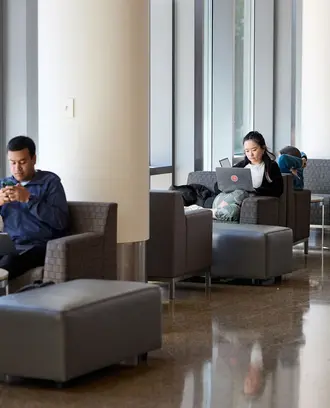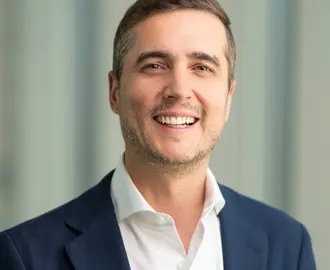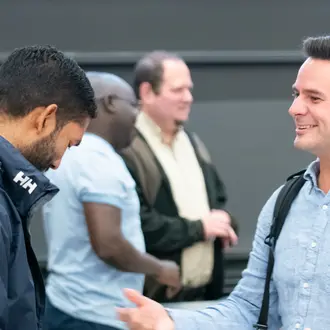Gemma Odena Bulto, SFMBA ’22, is a senior energy sector innovator who spent the formative years of her career working as a corporate innovation manager. She has deep experience leading international teams and collaborating with advanced technology partners to drive internal transformation. Gemma is currently an Associate Partner at McKinsey.
Why the MIT Sloan Fellows MBA?
Gemma Odena Bulto, SFMBA '22
Entrepreneurial innovation and tech are in my blood, so MIT has always been a dream for me, but I come from a low-income, first-gen household, so it never seemed like a realistic goal. Then, I traveled to Boston for business and decided to head over to MIT. At least I could visit, right? Well, it was wonderful —and the MIT Sloan Fellows MBA seemed made for me.
It set me dreaming again: what would it mean to be an MIT student? Stuck on a 13-hour flight back home, I gave myself a talking-to. Why not apply? Why not demystify this world I’d been so afraid of? So, I applied and didn’t apply anywhere else. I wanted to go to this one school, to this one program. And then it happened—I got in. My dream was becoming reality.
Did you have a plan for what you wanted to accomplish at MIT?
I’d been working on the corporate side of the global energy sector for almost a decade, and I wanted to increase my level of impact on the industry. Here’s the thing about energy: if you don’t have energy, you don’t have water, good sanitation, prosperous industry, or the essentials necessary to the human condition. Change must happen inside this sector—especially in utilities–since new technologies, electric mobility, and renewable energies require a modernized transmission and distribution network. It might not be the most attractive topic, but from my perspective, everything depends on the distribution and transmission of energy. These are urgent issues, and I wanted to make a meaningful difference in the problem.
Was the year what you expected it would be?
I came here with a few expectations, of course, but was pretty much unaware of what a year at MIT would really look like. During orientation, I listened to the Class of 2021 speak from a place of passion, leadership, and values, and I couldn’t imagine how I could get to that level. But a few months into the program, I was full of that same confidence and vision.
When I look back at the process, there was so much I had to learn to get to that point, but maybe the most important lesson was not to be afraid of what I didn’t know. It helps that the MIT SFMBA feels like a safe place to learn. Finance, for example, always intimidated me. Once I got over the fear of mastering the topic–and with the help and support from other Sloan Fellows–I became pretty comfortable with it and ended up enjoying the subject. And happily, I was able to immerse myself in the energy ecosystem at MIT. I helped organize the annual MIT Energy Conference and led one of the panels. This gave me a forum to voice my ideas about how to change the global energy situation.
Would you say that your year as an SFMBA changed you?
That’s a big question—with a long answer—but I’ll condense. One of the most valuable things I learned was self-awareness: of my skills, my leadership style, and my value in the world. I learned so much about deep listening in U-Lab and developed an understanding of my inner critic in Daena Giardella’s workshop. I also reached a significant degree of self-awareness during Deborah Ancona’s lessons on family ghosts. All those learnings were insightful for both my personal and professional lives.
As Sloan Fellows, we are taking this time to step out of the routine to analyze our lives through many different lenses. We enter this program worried about which courses we should take, but in the end, it really doesn’t matter. The MIT SFMBA experience is larger than that. I have not known anyone who did not transform as a person. If there’s a secret to the experience, it’s just being present at MIT, creating your own path, and not comparing yourself to others. It’s such a relief to find you don’t need to be something you’re not. In fact, you discover you have strengths in areas you never would have imagined. In the end, you are not the same person who signed up for those courses at the start of the program, and you need to acknowledge that and embrace who you’ve become.
You joined the MIT Sloan Senate. What motivated you to pursue that?
I felt it would help me to get closer to my cohort and learn more from the diversity of our class. Also, as a senator, I wanted to see how MIT works from the inside. How is it organized? How is it able to be so disruptive? How does the community work? I also wanted to exercise my muscles as a leader and try to create new opportunities for my class. I helped organize the Hackathon for Inclusion, for example, collecting challenges from the Career Development Office (CDO) and student groups to see how we could enhance Diversity, Equity, and Inclusion.
Did you find your peers in the program supportive?
We have this tradition in the program called Muddy Talks, named for the venerable Muddy Charles Pub on campus (although we didn’t actually meet there during the pandemic). At Muddy Talks, Fellows share their backgrounds, struggles, and disruptive paths. Connecting with people from vulnerability creates such strong bonds. You come to understand what the person has gone through and how they landed there. And on the academic side, if you don’t know much about a subject, those who do know it volunteer and organize review meetings to help you get through. We all have our special areas of knowledge, so we can learn from one another. If you are ever lost, someone is there to help.
How was the transition from Spain? Did you experience any culture shock?
In a global city like Cambridge, you are a citizen of the world, so the culture shock is lessened by that to some extent. And the members of the MIT SFMBA cohort who lived locally helped those of us from distant countries to get acclimated. When I arrived on campus, I received a warm welcome from other Fellows who opened their homes to me and called with promises of homemade food. Throughout the program, we spent a lot of time together organizing adventures and dinners out. When some of us couldn’t go home for the holidays because of COVID restrictions, we created our own Christmas dinner with our own memorable family moments.
Later, when I was preparing to interview for my job at McKinsey, the MIT Sloan Career Development Office recommended that I practice interview with different people with different interviewing styles. Ten or twelve Fellows helped me out. Now, I really want to give back because I benefited so much from the generosity of other Fellows during a challenging time. The sense of community in this program is definitely one-of-a-kind.
How did you come to a decision on your next step? Why McKinsey?
To be completely honest, I was exploring multiple options. I decided to transition towards a consulting career and apply to McKinsey after a process of self-discovery. I spoke with multiple coaches and professors and other changemakers—about 30 people in all. Their advice: define your own job. Thanks to them, I was able to develop my definition of a dream job, and I had a clear view of the impact I wanted to generate. It turned out to be at McKinsey. At MIT, I met people who were creating significant impact as consultants, and I felt that McKinsey and its extensive ecosystem would enhance my continuous growth. For one thing, consulting is the best platform for perfecting your communication skills, and I believe that if you want to be a leader, connecting and transmitting a clear vision is key to success. Thankfully, because there are so many MIT alumni at McKinsey, my network opened doors, and I was able to connect directly with those involved with the energy practice. The senior partner liked my value proposition, and several interviews later, I had my dream job—and a terrific new network.
Now that you’ve graduated, do you still keep in touch with your program peers?
Definitely. In fact, I have several support groups right now. At McKinsey, we have a company Slack channel just dedicated to us SFMBAs, and we support one another. Then, there are the Sloanies who are based in Miami, like me. Living in a new place, it’s wonderful to have the comfort of knowing that these are your people. They have your back—and you have theirs. I’m also helping the new class of Sloan Fellows prepare for interviews. I met with a member of the Class of 2023 and shared all the resources I collected during my job search. And there’s career counseling support you can access as an MIT alum that I turned to when I was making the transition from the corporate side to the consulting side of the energy business. They were super helpful.
Do you have any advice for incoming Fellows or those who are thinking about applying?
Getting to really know yourself—your strengths and what holds you back—that’s where you’ll find the biggest value. Most people don’t realize until the end of the program just how important that was, so I encourage Fellows to think about it right from the start. The MIT Sloan Fellows MBA is a transformational experience, and it develops through digging in. It’s a process that takes time, so use all 12 months. The sooner you start that process, the more growth you’ll experience. Take this one year as a sojourn to get out of your comfort zone and create a difference in your personal and professional lives. The very day you return to work, you will be shocked to realize just how many new skills you’ve gained. That’s when you will begin to understand just how much the MIT Sloan Fellows MBA experience has changed you.



